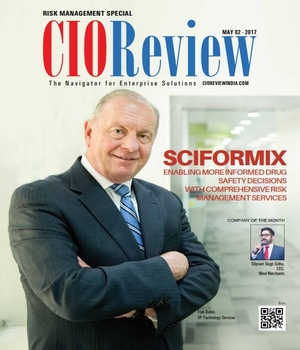
Supplier Sustainability New Frontier of Disruptive Innovation for Supply Chains
Kanishk Negi, Global SCM Sustainability Manager, ABB | Tuesday, 09 May 2017, 05:06 IST
 The operating environment of global businesses has drastically evolved over the past years. Recent legislations introduced by several countries require companies to take complete ownership of their supplier performance. This goes beyond the traditional areas of cost and quality and includes human and labor rights, safe operations, environmental impact and compliance. Customers and investors are increasingly incorporating these criteria to evaluate robustness of supply chains. The new focus on traceability and accountability has potential of disrupting the traditional supply chain approach and presents the opportunity to innovate and create new models of supplier engagement that are more efficient and create a sustainable and competitive supply base.
The operating environment of global businesses has drastically evolved over the past years. Recent legislations introduced by several countries require companies to take complete ownership of their supplier performance. This goes beyond the traditional areas of cost and quality and includes human and labor rights, safe operations, environmental impact and compliance. Customers and investors are increasingly incorporating these criteria to evaluate robustness of supply chains. The new focus on traceability and accountability has potential of disrupting the traditional supply chain approach and presents the opportunity to innovate and create new models of supplier engagement that are more efficient and create a sustainable and competitive supply base.
Complex Realities of Global Businesses
Globalization presents an interesting paradox. On one hand it has made the world smaller by making the products available from across the world, on the other it has increased the physical distances between the suppliers and consumers. From a manufacturer’s perspective it’s exciting, as one can access technology, suppliers and products across the world. However, the increased physical distance also poses a unique challenge of reliability of supplier relationship and risk factors ranging from regulatory to operational to overall approach to business that can disrupt the supply chain.
This becomes extremely important, as there is increased pressure on manufacturers to be accountable for their suppliers. The scope of accountability goes beyond the traditional areas of product quality and functionality. It includes whether the supplier is complying with regulations, internationally accepted norms of labor and human rights, safe working and environmental performance. These topics are clubbed under the umbrella term ‘supplier sustainability’.
New Frontiers for Supply Chains
In recent years, several legislations have been enacted bringing sustainability into core of supplier selection. However, these are the areas where tremendous scope of improvement exists. Especially in emerging economies, where the implementation of industrial regulations are not very stringent, inspired by the low cost of non-compliance and ‘general acceptance’ of malpractices due to various socio-economic factors. Legislations like California Transparency in Supply Chain Act (US), Dodd-Frank Act on conflict minerals (US), Federal Acquisition Register’s anti trafficking provisions (US), Modern Slavery Act 2015 (UK) and upcoming French and Australian legislations, are based on the premise that manufacturers have to evaluate their global supply chains for sustainability risks and ensure remedy. Ignorance or complexity of the supply base is not accepted as excuse for non-conformance.
This is a departure from the conventional mindset, where only cost and quality took precedence and above mentioned issues were rarely discussed. Even today most of the supplier evaluations by supply chain teams revolve around cost reduction, quality of incoming material and on time delivery (OTD). All other issues are deemed non-material.
Global businesses are also increasingly becoming cautious of the developments and relooking at their own supply organizations for compliance. More and more companies are including the sustainability criteria into their supplier screening process or at the initial stages of Request for Interest (RFI). A negative response by a supplier lowers the leverage compared to the ones who have a systematic approach to address these concerns.
Recognizing the business implications of non-compliant suppliers in the value chain and the global scrutiny, the investors are also becoming active in seeking clarifications about the approach to address these issues and demonstrate leadership. An investor network coordinated by CERES has seen over 60 shareholder resolutions only on the topic of supply chain from 2011-2016. This is a paradigm shift on how the business fraternity perceives risks and opportunities. While the risk of disruption is quite real, the opportunities presented are extremely rewarding but often overlooked.
Opportunities: Collaborate, Innovate and Accelerate
This new reality presents an opportunity to enter into a new realm of supply chain management; one where customers and suppliers collaborate to raise the standards of operations leading to strategic engagement rather than short term tactical arrangement.
Experience shows inefficient planning and execution is the root cause of majority of malpractices. Stringent adherence to the above mentioned conditions require revisiting the processes and review of policies and practices. Such a review, when forced upon as an external requirement can bring the desired seriousness and help identify the inefficiencies and improve the organization.
However, some of the malpractices like underpayment of wages/social security, excessive working hours, unsafe operations and ignoring environmental requirements are so deeply imbedded in the mindset that in many regions it has gained ‘silent’ acceptance. Low industrial wages, migration, socio economic dynamics and tendency to maximize profits often lead to such practices. This acceptance can only be reversed by constant engagement with suppliers. Clear communication on what is accepted and what is not, sharing best practices, bench marking performance and co-developing innovative approaches to address these concerns can go a long way in improving the situation.
Some approaches that can help above situations include careful review of capacity utilization, workforce deployment, correlation between job assigned and job done, control of HR processes and synergies of value chain within the organization. Additionally, higher degree of accidents/incidents not only hurt employees but also erodes productive man-hours, increasing stress on lead time and potential quality issues. When addressed, these can result in more efficient processes leading to improved productivity and better cost management for the supplier, thus changing the archaic perception that compliant operations are costlier. The integrated approach to organization review focuses on often ignored areas, leading to discovery of newer areas of efficiency. With increasing focus on sustainability issues in supply chain, only businesses that sustain these will be relevant and gain differential advantage. This will position them better for growth and improve chances of thriving in the ever competitive world.
CIO Viewpoint
By Uttam Kumar, Head - IT, Aircel
By Manish Sinha, Head-IT, Vectus Industries Ltd
Time to Stay Ahead of the Risk
By Neilmani Sahu, Head - IT, Staples India
CXO Insights
Project Management and Risk Planning
By Suresh .V. Menon; IASSC Certified Six Sigma Black Belt & Member RSISInternational.org
The CIO's Imperatives in IT - Enabled Productivity
By Satyen Vyas, President and CEO, SUMMIT IT Solutions Pvt Ltd.
Sustaining Long Term Customer Relations on...







